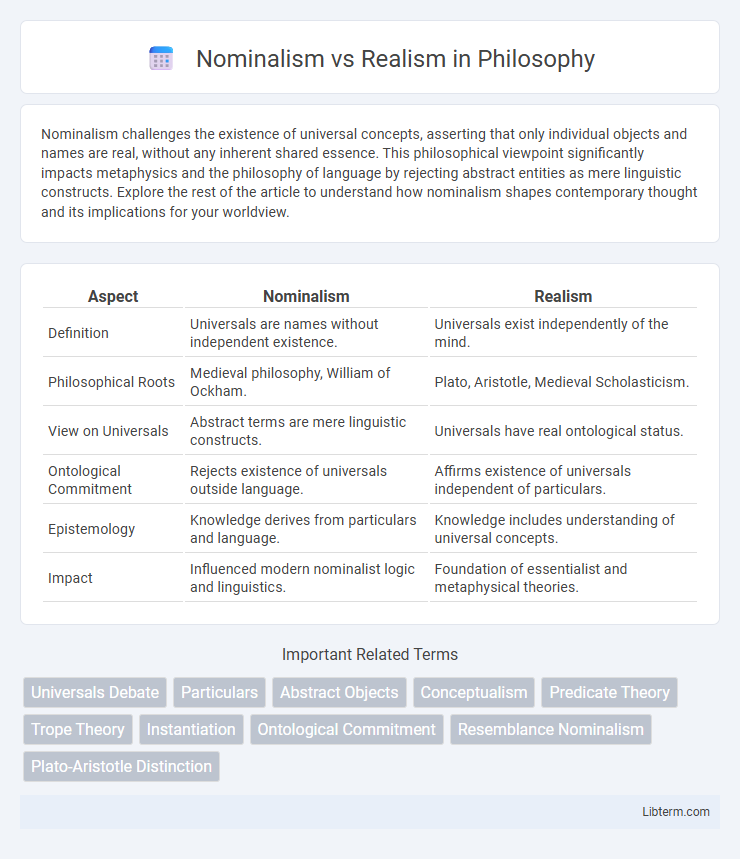Nominalism challenges the existence of universal concepts, asserting that only individual objects and names are real, without any inherent shared essence. This philosophical viewpoint significantly impacts metaphysics and the philosophy of language by rejecting abstract entities as mere linguistic constructs. Explore the rest of the article to understand how nominalism shapes contemporary thought and its implications for your worldview.
Table of Comparison
| Aspect | Nominalism | Realism |
|---|---|---|
| Definition | Universals are names without independent existence. | Universals exist independently of the mind. |
| Philosophical Roots | Medieval philosophy, William of Ockham. | Plato, Aristotle, Medieval Scholasticism. |
| View on Universals | Abstract terms are mere linguistic constructs. | Universals have real ontological status. |
| Ontological Commitment | Rejects existence of universals outside language. | Affirms existence of universals independent of particulars. |
| Epistemology | Knowledge derives from particulars and language. | Knowledge includes understanding of universal concepts. |
| Impact | Influenced modern nominalist logic and linguistics. | Foundation of essentialist and metaphysical theories. |
Introduction to Nominalism and Realism
Nominalism asserts that universals are mere names without any corresponding reality, emphasizing that only individual objects exist concretely. Realism, in contrast, posits that universals exist independently of the mind and particular instances, serving as real entities that explain common features among objects. The debate centers on whether abstract concepts have an existence outside human cognition or are simply linguistic constructs.
Historical Background and Key Philosophers
Nominalism and Realism emerged as central debates in medieval philosophy, shaping the understanding of universals and particulars. Realism, championed by Plato and later by medieval thinkers like Thomas Aquinas, argued that universals exist independently of the mind, whereas Nominalism, advanced by William of Ockham and Roscelin of Compiegne, claimed that universals are mere names without intrinsic reality. This philosophical conflict influenced ontology and epistemology, laying groundwork for modern metaphysics and logic.
Core Concepts of Nominalism
Nominalism asserts that universals and abstract concepts do not possess independent existence outside of particular objects, viewing them as mere names or labels created by human language and cognition. The core concepts of Nominalism include the rejection of universals as real entities, emphasizing particularity, and the belief that only individual objects exist concretely. This philosophy contrasts with Realism, which posits that universals exist independently and are more fundamental than individual instances.
Core Concepts of Realism
Realism asserts that universals and abstract entities exist independently of human thought, possessing an objective reality. This philosophical position maintains that categories like "redness" or "beauty" are real features of the world, not mere names or mental constructs. By affirming the existence of universals beyond individual instances, realism grounds knowledge and language in an external reality.
Major Differences Between Nominalism and Realism
Nominalism asserts that universals are mere names without any corresponding reality, emphasizing that only particular objects exist, while realism argues that universals exist independently of the mind and particular instances. Nominalists reject abstract entities, viewing concepts as linguistic constructs, whereas realists maintain that universals have objective existence beyond individual things. The debate fundamentally concerns the ontological status of universals, impacting metaphysics and epistemology.
Philosophical Arguments for Nominalism
Nominalism argues that universals are merely names without any corresponding reality, emphasizing that only individual objects exist concretely. Philosophical defenses of nominalism highlight the rejection of abstract entities, asserting that general terms do not denote real objects but are convenient linguistic labels for collections of particulars. This position counters realism by denying the independent existence of universals outside the mind, thus simplifying ontology and avoiding metaphysical commitments to abstract forms.
Philosophical Arguments for Realism
Philosophical arguments for Realism emphasize the independent existence of universals beyond individual instances, asserting that concepts like "redness" or "beauty" exist objectively in reality. Realists argue that universals are necessary to explain the commonalities observed across different particular objects and provide a foundation for knowledge and language. Key proponents such as Plato and Aristotle contend that universals ground truth and meaning, countering Nominalism's claim that only particular things and names are real.
Nominalism and Realism in Modern Philosophy
Nominalism in modern philosophy posits that universals are merely names without independent existence, emphasizing individual objects and rejecting abstract entities. Realism, conversely, asserts that universals exist independently of the mind, serving as real entities that ground the properties shared by multiple objects. The debate between nominalism and realism shapes contemporary metaphysics, influencing discussions on the nature of concepts, language, and the ontology of abstract objects.
Influence on Science, Language, and Metaphysics
Nominalism's rejection of universals as mere names shaped language theory by emphasizing concrete particulars, influencing scientific methods to prioritize observable phenomena and empirical data over abstract entities. Realism's assertion of universals existing independently fostered metaphysical frameworks that underpin theories of natural laws and mathematical objects, reinforcing the objective nature of scientific knowledge. This debate continues to impact semantic interpretations in linguistics and the philosophical understanding of concepts essential to scientific inquiry.
Conclusion: The Ongoing Debate
Nominalism and Realism remain central in philosophy, with Nominalism rejecting the existence of universal entities and affirming only particular objects, while Realism asserts the independent reality of universals. The ongoing debate influences metaphysics, epistemology, and language theory, reflecting divergent views on how concepts relate to reality. Resolving this dichotomy remains critical for understanding the nature of existence and the structure of knowledge.
Nominalism Infographic

 libterm.com
libterm.com